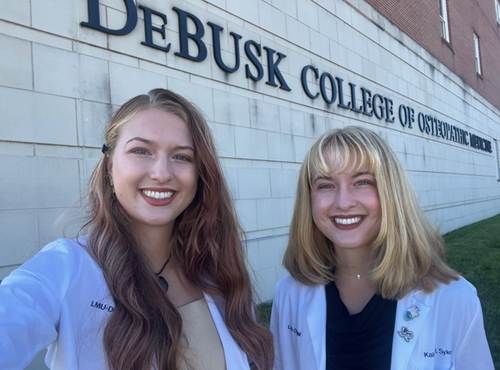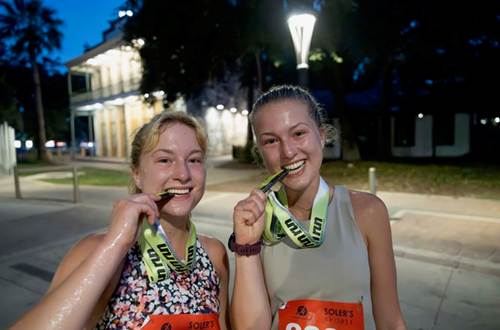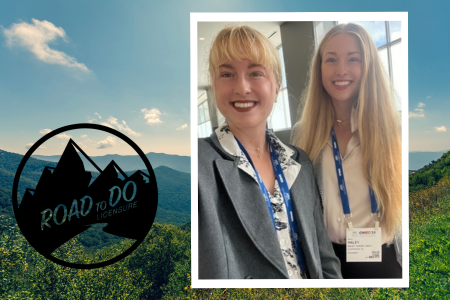
Twin sisters Haley and Kaley Sykes, both second-year osteopathic medical students at Lincoln Memorial University-DeBusk College of Osteopathic Medicine (Harrogate), share more than just a passion for medicine—they share a journey.
As President and Vice President of the Nutrition and Preventative Medicine Club associated with the American College of Lifestyle Medicine, respectively, these future physicians are committed to improving rural healthcare, particularly in their hometown in the Appalachian Mountains of Virginia. In this edition of Stories from the Road, they discuss their path to osteopathic medicine, their aspirations for the future, and what it’s like navigating osteopathic medical school with a built-in support system.
Why did you decide to choose osteopathic medicine as a profession?
Kaley: I was not one of those people who knew they wanted to be a doctor right from the start. When people used to ask me what I wanted to do, I honestly did not know. I considered pharmacy because my undergraduate program had a partnership with the local graduate school. However, when I shadowed, things changed. I felt like I wanted to follow the doctors when they came around. From then on, I knew being a doctor was what I wanted to do.
Looking back now, it’s clear that this profession was meant for me. I received a play doctor set for Christmas as a child and would “treat” my family all the time. I even played online surgery, knee replacements, and cesarean sections in elementary school. I am exactly where I am meant to be, especially given my choice of osteopathic medicine, which offers a more holistic approach. I can now really treat my family members with manipulative treatments right at home.
Haley: I did not know that I wanted to be a doctor until my junior year of undergrad (even though I had started studying for the MCAT just in case). All I knew was that I wanted a career—not just a job. I wanted to learn a lot and never stop. Believe it or not, I genuinely enjoy studying; I want to help others and make a positive impact on my community. I chose osteopathic medicine because it aligned with my personal values and beliefs. I feel that the body, mind, and spirit are made to be connected—and that when one thing is not working, the body is not at its full potential. Therefore, it is not just medicine that will fix a patient’s condition, but also changing lifestyle habits, such as diet, exercise, and relationships. I also found osteopathic manipulation to be an excellent skill set to have, and one that my community could greatly benefit from.
What appeals to you about the specialties you each chose?
Haley: We are both second-year students, so we have plenty of time to decide on a specialty. However, I am most interested in pediatrics, even perhaps a fellowship in endocrinology. Pediatrics appeals to me because I have the opportunity to make a positive impact on a child’s life at a young age. I shadowed a pediatrician while I was gaining hours for medical school applications. He told me a quote that has stuck with me over the years. He said, “If we are going to change anything, we have to start with the kids.” I think this is very powerful.
I am also passionate about overall health and wellness, particularly in the areas of exercise and dietary nutrition. We are seeing way too many kids developing obesity, diabetes, and other more adult-like diseases because of the way most Americans are living. I would love to help combat this and support the youth and their parents in making changes before it’s too late.
Kaley: I am leaning toward internal medicine. I feel that it is the most versatile specialty because I can work in a clinic or a hospital, especially when I want to return and practice as close to home as possible. I love the idea of going into rheumatology. My grandmother had arthritis issues and had to drive over two hours to see a doctor. Even when I told her to go, she would just say it was not worth the trip. I would love to see how many people could be helped if driving so far were not an issue, as it often is in rural areas.
You mentioned that you both want to go back and practice in your rural town. How do you plan to improve the health of your community?
Haley: My idea after graduation is to secure a residency in pediatrics and then to open my own clinic in my hometown with my sister; she wants to do adult medicine and I want to see the kids from 0 to 18 years old, so when they’re old enough I would send them over to her side of the clinic. Establishing a primary care office in my hometown would also ensure that patients don’t have to drive for over an hour to see a doctor.
Additionally, I would like to help educate the community about healthier habits and the importance of daily movement. A goal of mine and Kaley’s is to have an influence on the community in general—maybe by lobbying the town to build a park for kids to exercise in, or a green belt walking or running trail that does not currently exist in our town.
Kaley: Residency may take me wherever, but I want to practice in a smaller area. I love rural life, and I hope to be able to help those I love when I return. I want to work in a community that trusts me, which I believe would significantly improve patient care. I would love to work with or near my sister.
Why is rural health care a passion of yours?
Haley: I take pride in coming from a rural area, and I embrace the limits of where I live. For example, if I want to go shopping, I have to plan a trip. I can’t just decide on a whim to go to the store and be there in 10 minutes or less. Some people may not like this, but for me and most people who choose to live in a rural area away from the hustle of the city, it is special. However, we don’t enjoy having to do this for our healthcare.
Right now, we don’t have enough physicians who return to less populated areas or have sufficient facilities. I try not to think of this as a disadvantage but as an obstacle I get to overcome. I am passionate about rural areas receiving the same level of care as cities. I hope we can change this in the future, and I want to start by returning to my hometown and helping the families I grew up with.
Kaley: I love where I live. My hometown is small, but I had never really seen that as a disadvantage until I had to go to the doctor, which was one to two hours away. Driving multiple hours for good health care is not acceptable. Having more doctors in these rural areas is essential for better health outcomes, especially if the doctors are from those same areas. I know my home and neighboring towns, so I feel I could connect with the people. I would say that rural healthcare is less of a passion and more of my life.
What was it like attending osteopathic medical school with a built-in support system?

Haley: Medical school would not be the same without my sister. I honestly do not know how other people go through this process without a twin by their side. We have always been close, from both majoring in cell and molecular biology to running Division II cross country together.
The fact that we can study together and help each other out when one of us is struggling is amazing. I could be having trouble with a concept, and easily look over at her for help with a question I couldn’t answer. We help fill each other’s knowledge gaps.
Also, not just school-related, but we are best friends, so in our minimal breaks, we can always find ways to relax together, like running or cooking.
Kaley: Going to medical school together has been such a blessing because I don’t know how anyone does medical school, let alone life, without a twin. We think similarly and comprehend information in the same way, which enables us to study well together. When I don’t understand the point the lecturer is trying to make, I can pause the lecture and ask her to explain it to me. Additionally, when we go for a run, we can quiz each other on our upcoming practical.
We have been together our whole lives, so even though medical school was a change, having her as my constant was probably the biggest help when trying to adjust to the new normal. Honestly, I feel like we have an unfair advantage, and one that I hope that I never take for granted.
What tips would you give to those who will be preparing to take COMLEX-USA?
Kaley: You can study too much. Please take time for yourself to go for a run or even an Anki walk if you can’t stop for that long. For those wondering, Anki is the online spaced repetition flashcard tool I use on my phone to be active and outdoors when I still need to study and don’t have the time to work out.
Eating healthy home-cooked meals and getting quality sleep can definitely help you get more from your studying hours than battling exhaustion throughout the whole day. You think it may take a couple of hours from the study day, but all in all, you will be better off.


